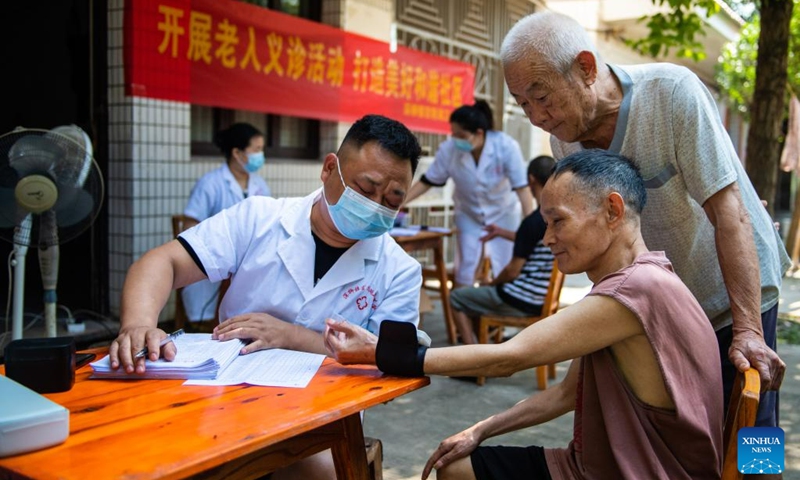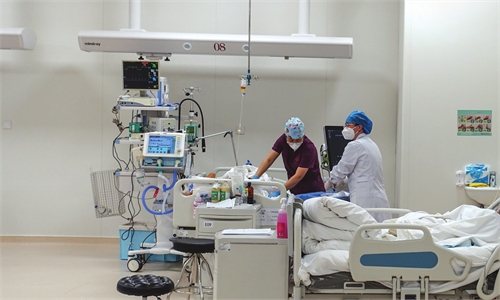
A medical worker conducts medical examination for a senior resident at a nursing home in Anxiang County of Changde City, central China's Hunan Province, June 21, 2023. The city of Changde has scaled up efforts to develop an elderly care service system composed mainly of in-home cares, community services, institutional and medical cares. Photo: Xinhua
Together with other nine departments, the National Health Commission (NHC) has launched a one-year campaign to crack down on corruption in the healthcare sector across the country, focusing on "key few" and key positions in the pharmaceutical industry to ensure high-quality development of the medical and healthcare sector, the NHC announced on Tuesday.
Since China started the sweeping anti-corruption drive in the public health sector in mid-July, at least 176 Party secretaries or heads of hospitals had been put under investigation as of Saturday, according to media estimates.
Strengthening the anti-corruption work in the healthcare field is an important content of promoting the high-quality development of the pharmaceutical industry, and an important part of improving the construction of the pharmaceutical governance system.
In recent years, some people in key positions have been guilty of accepting kickbacks, bribery and profiteering, among other crimes, thereby seriously diluting the dividends gained from the reform and development of the pharmaceutical industry and eroding the rights and interests of the people. This not only hinders the reform and development of medical, insurance and pharmaceutical undertakings, but also jeopardizes the interests of the vast majority of people in the field of medicine and health, the NHC said on Tuesday.
The one-year campaign covers the entire chain of production, circulation, sales, use and reimbursement in the pharmaceutical industry, as well as pharmaceutical administrative departments, industry associations, medical and health institutions, pharmaceutical production and operation enterprises, and medical insurance funds, according to the NHC.
This concentrated campaign will focus on six aspects: administrative departments in the field of medicine using power for profiteering; the "key few" and major key positions in medical and health institutions; sales representatives for drugs, equipment, and consumables; social organizations that accept the management and guidance of administrative departments that use their position for self benefit; illegal acts by pharmaceutical enterprises during purchases and sales; and medical staff in violation of the standards for integrity, the NHC said.
Recently, some media outlets have reported on the suspension and postponement of some academic conferences due to the anti-corruption campaign. However, the NHC responded that what needs to be remedied is the illegal behavior of fabricating academic conferences out of thin air, carrying out illegal benefits transmission, or illegally sharing the sponsorship fees of academic conferences.
Medical experts said that the anti-corruption campaign in the sector this year is different from previous campaigns, as it is sweeping and more vigorous than ever.
Corruption in the medical sector is a serious issue that affects the credibility of the healthcare system and the interest of patients, said Zhong Chongming, an expert from the China Health Culture Association.
As the medical anti-corruption campaign has received widespread attention, some social platforms have exposed several corruption cases. In one case, Xu Bo, the director of the cardiac catheterization room at Fuwai Hospital, the Chinese Academy of Medical Sciences, was investigated by the discipline inspection team of the Central Commission for Discipline Inspection and the NHC of the State Supervisory Commission for suspected serious violations of discipline and law. At present, the case is still under investigation.
After confirming with related departments, the NHC said that online rumors about Xu using the opportunity of surgeries, consumables, and participation in the procurement of medical equipment bidding to accept bribes of up to 1.2 billion yuan ($165.6 million) are seriously inconsistent with the current investigation of the case.
Global Times

